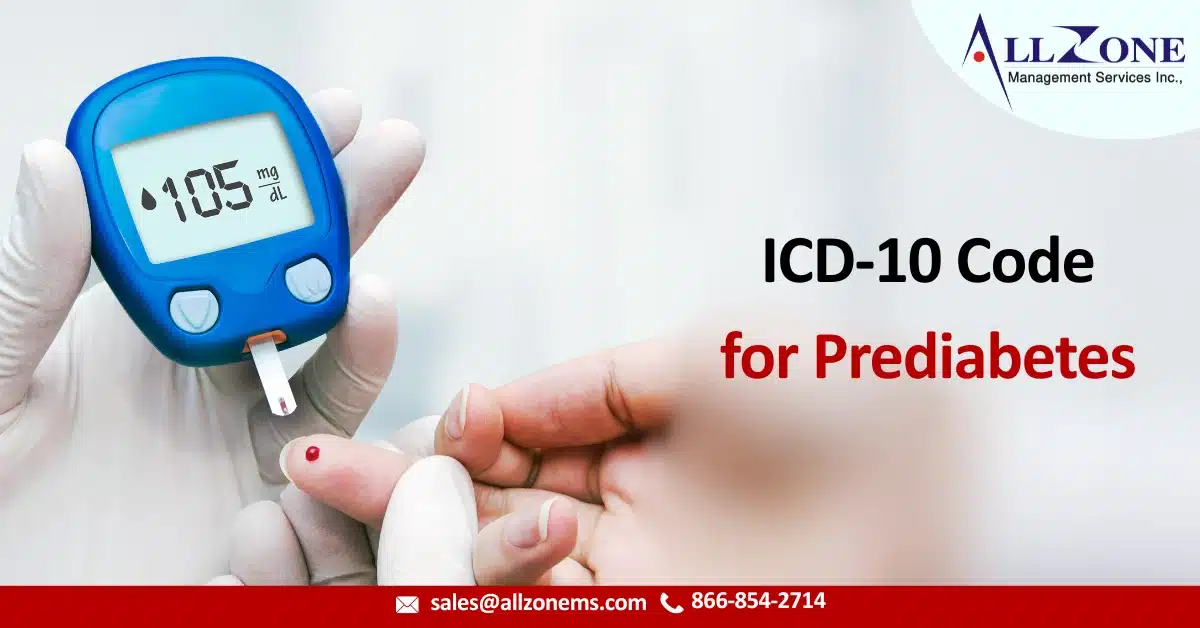Prediabetes is a growing health concern affecting millions of Americans, and accurate medical coding plays a crucial role in identifying and managing this condition effectively. For healthcare providers, understanding the ICD-10 code for prediabetes, associated billing guidelines, and coding best practices is essential for ensuring accurate reimbursement and compliance with payer requirements.
This article explores the correct ICD-10 coding for prediabetes, documentation requirements, billing practices, and the specialties most involved in diagnosing and managing this condition.
Understanding Prediabetes and Its Importance in Coding
Prediabetes refers to a condition where blood glucose levels are higher than normal but not yet high enough to be classified as diabetes mellitus. Without timely intervention, prediabetes often progresses to Type 2 diabetes, increasing the risk of cardiovascular disease and other complications.
Accurate ICD-10 coding enables providers to:
- Track and monitor patients at risk of developing diabetes.
- Ensure proper insurance coverage for preventive interventions.
- Contribute to public health data and chronic disease management programs.
ICD-10 Code for Prediabetes
The official ICD-10-CM code for prediabetes is:
R73.03 – Prediabetes
This code is used when a patient has laboratory evidence of impaired glucose metabolism that does not meet the diagnostic criteria for diabetes. It applies to cases identified through screening tests such as:
- Fasting Plasma Glucose (FPG): 100–125 mg/dL
- HbA1c: 5.7%–6.4%
- Oral Glucose Tolerance Test (OGTT): 140–199 mg/dL (2-hour value)
Code Category:
- Chapter 18: Symptoms, signs, and abnormal clinical and laboratory findings, not elsewhere classified (R00–R99).
- Subcategory: Abnormal findings of blood chemistry (R73).
Related ICD-10 Codes for Abnormal Glucose Findings
While R73.03 specifically refers to prediabetes, related codes may be used based on clinical findings:
| ICD-10 Code | Description |
| R73.01 | Impaired fasting glucose |
| R73.02 | Impaired glucose tolerance (oral) |
| R73.09 | Other abnormal glucose |
| R73.9 | Hyperglycemia, unspecified |
Note: Selecting the correct code depends on the patient’s test results and the documentation provided by the physician. Coders should avoid unspecified codes unless clinical details are unavailable.
Billing Guidelines for Prediabetes
Billing for prediabetes involves not only assigning the correct ICD-10 code but also pairing it with appropriate CPT® and HCPCS codes for services rendered.
1. Commonly Used CPT Codes:
- 82947 – Glucose; quantitative, blood (except reagent strip)
- 82950 – Glucose; post glucose dose (includes glucose)
- 83036 – Hemoglobin A1c (HbA1c)
- 82951 – Glucose tolerance test (GTT); three specimens (includes glucose)
2. Preventive Counseling Codes:
Prediabetes management often includes counseling and preventive care. Use the following codes when applicable:
- 99401–99404 – Preventive medicine counseling
- G0108 – Diabetes outpatient self-management training, individual
- G0109 – Diabetes self-management training, group session
3. Evaluation & Management (E/M) Codes:
For office visits related to diagnosis, follow-up, or preventive counseling:
- 99202–99215 – Office or other outpatient services (new/established patient)
4. Modifier Use:
If prediabetes is addressed during a preventive visit, use modifier -25 to indicate that a significant, separately identifiable E/M service was performed on the same day.
Documentation Requirements
Proper documentation is the foundation of accurate coding and billing for prediabetes. Providers should ensure the following details are included in the patient record:
- Results of glucose or HbA1c testing
- Risk factors such as obesity, family history, or hypertension
- Counseling or preventive care provided
- Follow-up plan and recommendations
Incomplete or vague documentation can result in claim denials or downcoding by payers.
Common Billing and Coding Errors to Avoid
- Using unspecified codes (R73.9) when specific results are available.
- Omitting diagnostic test results in the documentation.
- Incorrect linkage between diagnosis and procedure codes.
- Failing to capture preventive counseling services that are reimbursable.
- Neglecting to document time spent during counseling sessions, which may affect coding levels.
By following payer-specific guidelines and maintaining detailed clinical documentation, providers can minimize claim denials and optimize revenue.
Specialties Involved in Prediabetes Management
Several specialties play a role in diagnosing and managing prediabetes, including:
- Primary Care Physicians: First-line detection through routine screening.
- Endocrinologists: Manage complex glucose metabolism cases.
- Internal Medicine Specialists: Address metabolic risk factors and comorbidities.
- Nutritionists/Dietitians: Provide dietary counseling for lifestyle modification.
- Cardiologists: Monitor cardiovascular risks associated with insulin resistance.
A multidisciplinary approach ensures comprehensive care and improves patient outcomes while facilitating accurate coding and billing.
Best Practices for Prediabetes Coding and RCM
Accurate coding and effective Revenue Cycle Management (RCM) processes are essential for maximizing reimbursement and ensuring compliance.
Here are key best practices:
- Stay Updated with ICD-10-CM Revisions: Review annual updates from the CDC and CMS to ensure code accuracy.
- Leverage Electronic Health Records (EHRs): Integrate automated prompts to identify abnormal glucose findings and flag potential prediabetes cases.
- Educate Providers and Coders: Regular training sessions help reduce documentation errors and improve coding precision.
- Implement AI-Driven Coding Tools: AI-assisted medical coding solutions can analyze clinical documentation and suggest appropriate ICD-10 codes, reducing manual errors.
- Monitor Denials and Audit Regularly: Establish denial management processes to identify and correct recurring issues related to documentation or coding errors.
Prediabetes and Value-Based Care
With healthcare shifting toward value-based reimbursement models, coding prediabetes accurately is more important than ever.
Proper documentation of early-stage conditions like prediabetes enables:
- Tracking of population health metrics.
- Identification of at-risk patients for preventive care.
- Improved reimbursement tied to quality and outcomes rather than volume.
By coding prediabetes correctly, providers contribute to improved patient care and financial performance under value-based care initiatives.
Conclusion
The ICD-10 code R73.03 for prediabetes plays a vital role in early detection, preventive intervention, and care coordination. Correct medical coding ensures that healthcare providers are reimbursed accurately while helping patients avoid progression to diabetes through timely care.
By following proper billing guidelines, maintaining precise documentation, and integrating RCM best practices, medical practices can streamline operations, reduce denials, and support better health outcomes.

